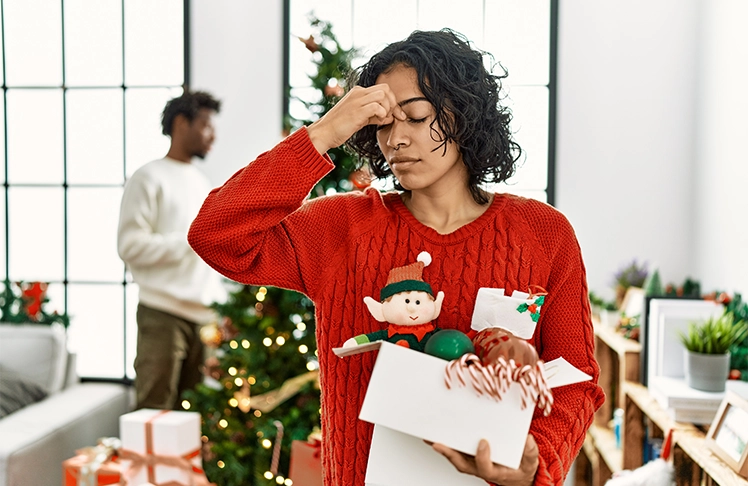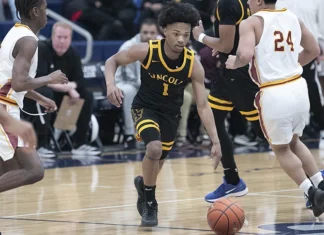
By Aaron Allen, The Seattle Medium
As the holiday season approaches, many look forward to celebrations, family gatherings and joyful traditions. But for others, this time of year can trigger difficult emotions including anxiety, depression and loneliness. Current events and personal circumstances may amplify these feelings, making it harder to experience the joy and connection that the season often promises.
While some embrace the festivities with loved ones, others find themselves reflecting on loss, enduring family conflicts or coping with feelings of isolation. For many, depression becomes a constant threat during this season. Although winter has historically posed challenges for human well-being, individuals facing emotional struggles during the holidays do not have to navigate them alone.
Psychologists describe holiday depression as a condition that mirrors regular depression but is specifically triggered by seasonal events such as holiday gatherings, family visits or the pressure to socialize. It may resemble the winter blues, but its onset can be more abrupt and tied to the rhythm of celebrations. It may come in short waves as events approach and pass, or it may linger for weeks before and after the holidays.
“As a psychologist, there are a couple of ways in which depression affects people. One of the ways that depression affects people is behaviorally, and that it tends to make people less interested in going out and meeting with people and it results in you feeling less excited about things that were once exciting for you,” says Adam Kuczynski, PhD, a clinical psychologist with UW Medicine. “It makes social interaction more difficult, and so one of the effects that we see of depression is that people just do less. They withdraw.”
Depression can be highly disruptive, affecting relationships, mental health and the ability to maintain daily routines. Its causes vary, and the impact of the holidays depends greatly on each person’s life circumstances.
“Another major way that depression affects people is less behavioral, more cognitively, so it affects the way that we think about ourselves, it affects the way that we think about our world, it affects the way we think about other people’s intentions,” says Kuczynski. “We’re more likely to have develop thoughts related to lower self-esteem, an inability to do something. So, another way that psychologists or mental health clinicians in general work with people with depression. is to help them challenge those negative thoughts that they have about themselves, about other people, and about the future.”
Common triggers of holiday depression include stressful schedules, separation from loved ones, unresolved family dynamics, social anxiety, past trauma and the emotional toll of the season itself. People may not always recognize when their feelings go beyond typical seasonal sadness.
Whether someone is familiar with holiday depression or is experiencing it for the first time, mental health professionals recommend watching for signs that suggest more serious emotional distress:
• Feeling depressed and hopeless for more days than not
• Loss of interest in things once enjoyed
• Constant anxiety, nervousness or tension
• Difficulty sleeping for an extended period
• Intrusive thoughts that feel unmanageable
• Thoughts of self-harm or suicide
If any of these symptoms are present, reaching out to a primary care provider or a mental health professional is an important first step. For those at risk of harm, help is available through resources such as the 988 Suicide & Crisis Lifeline, which offers support by phone, chat or text, or through emergency services including hospitals and 911.
Diane Mayes, MA, LMHC, MHP, CWPC, Clinical Director of 988, explains what individuals can expect when they contact the Lifeline.
“Anyone experiencing emotional distress or mental health concerns such as suicidal thoughts, depression, anxiety, or substance use related support, or who has a loved one in crisis, can call, text, or chat 988 and reach caring support,” says Mayes. “The person who contacts 988 defines their crisis, we accept all contacts 24/7. When connecting with 988, help seekers reach a crisis specialist who will ask about their safety, listen to their concerns to understand how their problem is affecting them, provide support, and share any resources that may be helpful for additional support if needed once the contact ends.”
Managing holiday depression can feel overwhelming, but Kuczynski encourages individuals to begin with manageable actions.
“I think that’s going to be your biggest step, get out there, lean on your social supports, be active, do things that are personally valuable to you,” says Kuczynski. “That brings you a sense of purpose and direction, those are going to be one of your longer-term coping skills for depression.”
“I would really emphasize the nature of doing the small steps,” Kuczynski continued. “It does not need to be big. Big tends to be overwhelming, especially when you’re depressed, and so starting small.”
Experts suggest a variety of strategies to manage emotional well-being during the holidays. Remembering a lost loved one at a holiday gathering can help acknowledge grief in a healing way. Setting boundaries with difficult relationships can prevent emotional harm, especially when family dynamics are strained. Staying connected with others, even outside one’s immediate family, helps reduce isolation. Participating in charity work or volunteering can create a sense of community and purpose. Limiting social media use can also reduce the negative impact of comparing oneself to idealized holiday images.
Even when taking these steps, some people may continue to experience stress, depression or anxiety. Seeking professional help can make a significant difference. For those experiencing mild to moderate depression, therapy is often the first recommended treatment. In more serious cases, a combination of therapy and medication may be most effective.
“In terms of the most effective treatments for depression, there’s the lifestyle stuff, lifestyle changes. Formal treatments for depression, the gold standard is antidepressant medications in combination with psychotherapy,” says Kuczynski. “For people with mild to moderate forms of depression, the first line treatment, it’s often psychotherapy alone. If somebody is amenable to taking medications, it, the research suggests that both in combination are best.”
While the holidays may stir mixed emotions, no one has to struggle in silence. Recognizing the signs of holiday depression and taking small steps toward support and connection can make a meaningful difference. Whether through personal action, community engagement or professional care, there are ways to cope, and to find hope.



